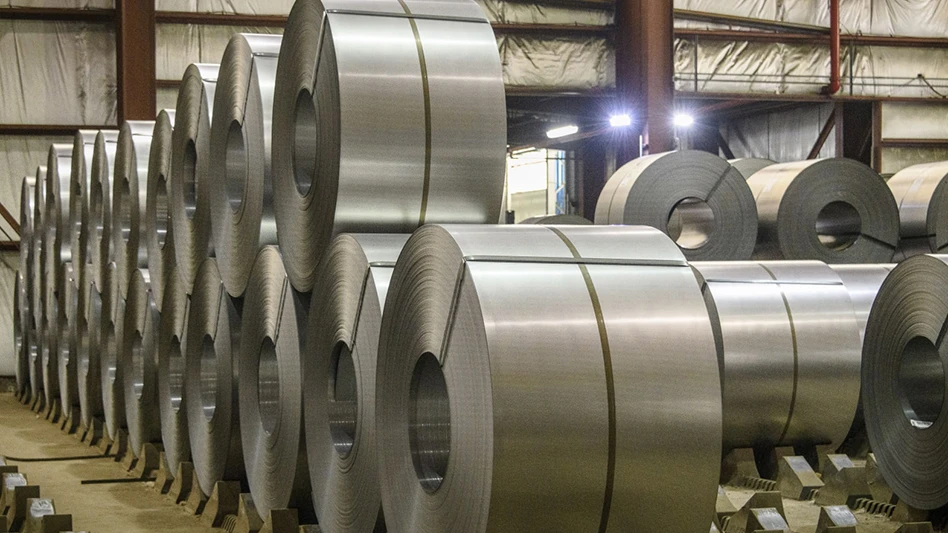The growing popularity of mobile shredding means more trucks are on the road, and with more trucks at work, more attention is being paid to the risk of shredding truck fires.
"It can happen in virtually any type of truck or operation," says Scott Starr, marketing manager for FireTrace International LLC, a Scottsdale, Ariz. company that makes fire suppression equipment. The secure shredding business is one of several industries for which FireTrace makes equipment.
Fortunately, between the fire suppression equipment designed by shred truck manufacturers or by specialty manufacturers and the proper maintenance and use, mobile shredding companies can take many steps to protect their operations and their employees from truck fires.
FEELING THE HEAT
While some suggest that hammermill shredding trucks could be more prone to fires, Lewis Barbe, a fire protection engineer who works as a consultant for a shredding truck manufacturer, says there’s pretty much an equal chance of a fire no matter what kind of shredder is employed.
| Insuring Protection |
|
A number of insurance options are available to protect secure destruction companies in the case of mishaps. The RecycleGuard Insurance Program, Portsmouth, N.H., has introduced ShredderGuard—an insurance program specifically designed for the secure destruction industry. "The ShredderGuard program is designed to be a one-stop insurance solution," says Monica McNally of RecycleGuard. The program addresses property, general liability, professional liability, automobile and worker’s compensation needs. The program is designed to cover the needs of plant-based and mobile operations. It also covers general liability in the case of unauthorized access to or theft of sensitive documents; intentional acts by an employee; negotiable instruments falling into the wrong hands; identity theft stemming from information on sensitive documents; violations of privacy like those involving medical records; negative publicity from release of sensitive documents and improper handling of documents required in a court proceeding. McNally says secure shredders face a number of unique challenges—the hiring of the right employees chief among them. "With identity theft on the rise, it is critical that the people who are dealing with secure information be screened properly to avoid exposure to loss," she says. Fire is another key concern because of the hazard caused by storing significant amounts of paper. The ShredderGuard program allows companies to deal with a local insurance agent, providing the shredder with "the expertise of a provider who understands the industry while still being able to maintain local representation for servicing needs," says McNally. More information is available from RecycleGuard at www.recycleguard.com. |
"Anytime you hit something metal, you create a spark," Barbe says, adding that any condition that mixes metal with paper creates the potential for starting a fire.
The two main sources of fire are dust and contaminants, which are common regardless of the type of shredder in use, says Starr. Metal contaminants create a particularly fire-prone situation, Starr says. He identifies "improper materials put into a bin destined for shredding" as a top cause of truck fires. "I’m sure everybody has seen something [in a bin] that doesn’t belong there," he says.
Fires are more likely to occur when "people don’t know what they’re shredding," says Barbe. "They’re told they’re going to shred paper and, all of the sudden, they get some computer boards in there—they have metal, so they’re going to get sparks."
A secure shredder on the West Coast identifies dust buildup as particularly volatile in hammermill style trucks. "You let dust build up in the system of a hammermill truck and you have tramp metal in there, it will spark and start fires," he says. He also says plastic contaminants can overheat, melt and start fires.
Even if the material stream is contaminant-free, the mechanics of shredding can create a combustible situation, says Starr. "There’s a lot of paper dust that gets into everything in these shredder units," he says. "It can work into the bearings, cause the lubricants to dry out and make the conditions right for a spark."
And with a truck bed full of dry paper, one spark could be disastrous.
SUPPRESSION TECHNOLOGY
Depending on when and if the fire is caught and extinguished, the potential for damage is extensive—damaging not just the box and the material inside, but the shredder and truck body as well.
"The entire truck can go," says Starr. "An unchecked fire will take the whole truck very easily."
Even more damage can occur depending on where a truck is located when a fire occurs, Starr adds. If a truck is parked indoors or on a loading dock, there is always a possibility for the fire to spread to nearby structures, he says.
Parking a truck indoors is seldom a good idea for that very reason, says Barbe. "Every manufacturer says to everyone: Do not store a truck in a building," he says. Barbe adds that manufacturers also clearly instruct to never leave a truck full overnight. He says leaving a truck full overnight creates the perfect environment for fire—enough time for the chemical reaction to spark, plus no one is around to notice the fire and extinguish it.
Many systems are available to mobile shredders to protect their trucks against fire. For instance, many shredding truck manufacturers build fire suppression equipment into the vehicles in the first place. Starr says this equipment is typically a tank of water that uses pressure form the braking system to put out the fire. The system is good, Starr says, but not automatic—it requires an operator on hand to notice the fire and to take action.
Starr says this brake-based system might not be as effective against slower growing fires, which can "smolder long after the operator has gone home."
In addition, suppression systems that rely on water could also pose a problem for shredders who supply their material to the paper recycling market after it’s been shredded, says Starr. Depending on what market they are in and what grade they aim for, shredded paper could be ruined for the secondary market by water damage.
Automatic systems from companies like FireTrace place sensors in the shredder box that detect flames. Then a tank stored near the shredding mechanism itself releases a gas fire suppressant. The gas will not harm anyone who comes in contact with it and dissipates as soon as the shredder box is opened, according to Starr.
Gas-based, automatic equipment will usually feature a manual activation feature as well, if the operator notices something going awry before the sensors do, says Starr.
According to Barbe, other suppression systems are available, including systems that use sand as a suppressant and models that eject material that has caught fire from the truck.
No matter what type of fire suppression equipment is employed, there are many steps secure shredding companies can take to make sure they don’t have to use it in the first place.
AN OUNCE OF PREVENTION
Barbe says truck fires are not necessarily random. While some companies have frequent incidents, others have never had a fire at all. "They are common only if you’re irresponsible," he says.
Barbe advises adhering closely to manufacturers’ specifications and keeping up on regular maintenance. "Watch the oil lines, the belts on the motors, the cutterheads," he says. "It’s all about the maintenance—if you do things right, it won’t catch fire."
However, Starr advises shredders to keep in mind that the strictest maintenance program is no absolute guarantee against the threat of fire. "Realistically, it’s kind of a fact of the business," he says. "It’s got the potential to happen."
Therefore, operator training is one of the best defenses against truck fires. Shredders should "make sure their drivers are aware of the hazard and know what to do if the situation arises," Starr says.
The author is associate editor of Secure Destruction Business and can be contacted at jgubeno@gie.net.

Explore the April 2006 Issue
Check out more from this issue and find your next story to read.
Latest from Recycling Today
- Fitch Ratings sees reasons for steel optimism in 2025
- P+PB adds new board members
- BlueScope, BHP & Rio Tinto select site for electric smelting furnace pilot plant
- Magnomer joins Canada Plastics Pact
- Out of touch with reality
- Electra names new CFO
- WM of Pennsylvania awarded RNG vehicle funding
- Nucor receives West Virginia funding assist





